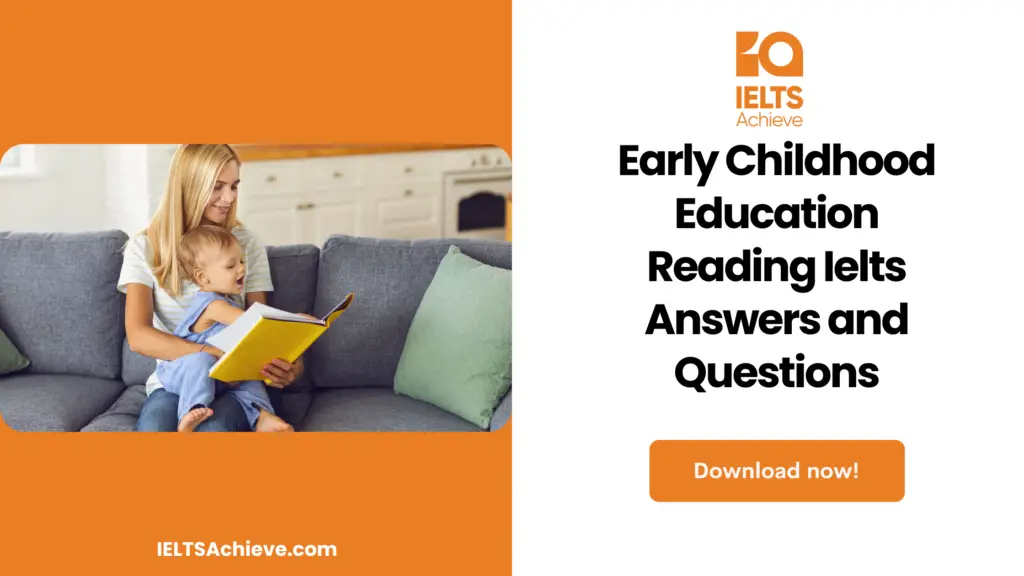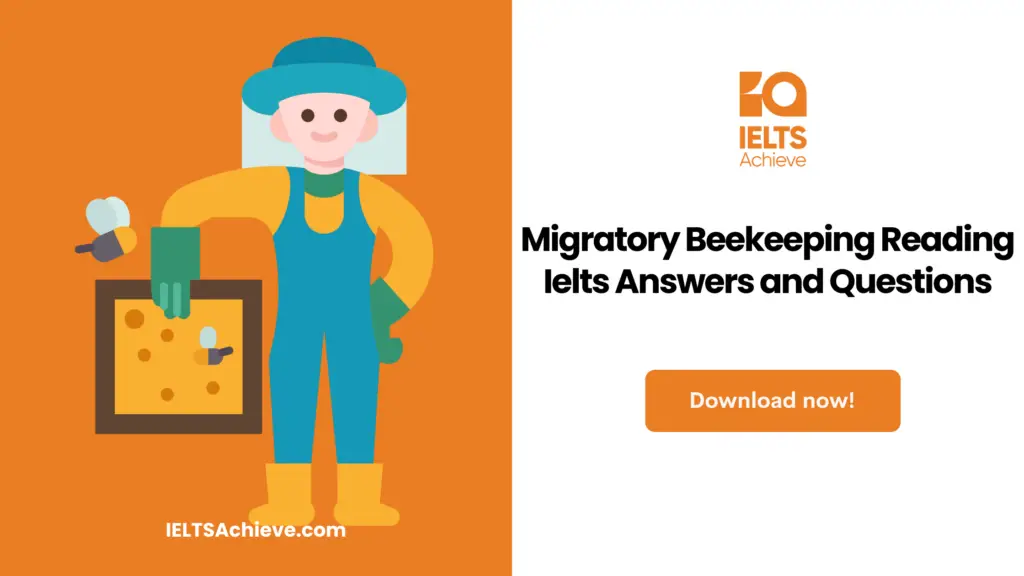The Blog post contains the following IELTS Reading Questions:
- IELTS Reading Matching Headings
- IELTS Reading Note Completion
- IELTS Reading Yes/No/Not Given
Stay informed and prepared for success – Explore our comprehensive Reading Test Info page to get valuable insights, exam format details, and expert tips for mastering the IELTS Reading section.
IELTS Reading Passage – Early Childhood Education

Early Childhood Education
Dr. Lockwood Smith’s recent visit to the US and Britain came with a list of findings. Being New Zealand’s National Party Education’s spokesman reports the key findings of his visit and reveals the prospects in New Zealand’s education policy.
‘Education To Be More’ is a report pertaining to the New Zealand Government Early Childhood Care and Education Working Group. It was published last August, discussing the enhancement of access and funding for childcare and early childhood education institutions. Though education is a necessity, parents don’t send children to pre-schools until they attain three years of age. Are they missing out on the most crucial years of all? Let’s see further.
A 13-year research study of early childhood development at Harvard University reveals that most children after the age of three have the ability to understand nearly 1000 words – most of the vocabularies they will practise in normal conversation for the rest of their lives. In addition to that, research shows that as every kid born will be curious, however, it can be controlled significantly in their second and third years of life. Researchers say that human behaviour gets into shape during the first two years. Similarly, during the first three years children acquire the fundamental skills which will be used later at home and at school. Once children cross three years, they try to spread their existing knowledge of the world.
A general fact is that children from poorer socio-economic backgrounds are likely to perform not well in studies. It’s acknowledged not only in New Zealand but also in Britain, America and Australia. To tackle the educational issue, a nationwide program known as ‘Headstart’ was initiated in 1965 in the United States, with a pool of money. It made a path for children to join in pre-school institutions after turning into three, and facilitated the children from poorer families perform better in school. Besides so much investment, the result was not as expected. It is because of two things. First, the program started too late. Most of the children who enrolled in it were already behind their peers in language and reasonable intelligence. Second, there is no participation from the parents. After school hours, children go back to the same home where parents don’t know how to improve their skills.
Now it has become evident from the pilot program ‘Headstart’ launched in Missouri in the US that the first three years of a kid’s life are important. This growing need shows that working with the parents rather than ignoring them from the process of child’s education is the most effective way of improving children’s learning abilities. The four-year pilot study involved around 380 families who have one child, and are from a cross-section of socio-economic background, etc. The other factors include age and family configurations. For this pilot study, they included single-parent and two-parent families. Moreover, it included families where both parents are working and families where one parent is at home.
The program is associated with parent-educators who visit the parent’s home engaging with tired parents or parents and the child. Know the child’s development, necessary advice on things to care for, and what to expect as the child grows, etc. all such information is given. It also added the guidance in keeping the child’s intelligence, language proficiency, social and motor-skill development. Regular diagnoses of the child’s academics and sensory development (hearing and vision) were kept available to measure possible hurdles that help with development and growth. In case of medical issues, they met the medical practitioners. Parent-educators visited homes and conducted group meetings every month with new parents. They shared experiences and discussed topics of varied subjects. Apart from that, parent resource centres offered study materials for families and facilitators for the child core. It is located in each school building.
The children at three years of age, who had been indulged in the pilot program ‘Missouri’ were analysed alongside a similar section of children chosen from the same range of cross-section, socio-economic aspects and family conditions, and also the same age of children as samples. Astonishingly, the results were excellent. The children with the same age group were more advanced in language proficiency than their counterparts. They showed greater potential in problem-solving techniques and other intellectual skills, besides social development. Here, the average performance of a child in this program was at the level of top 15 to 20 percent compared to their peers in things like verbal ability, language skills, and auditory comprehension.
Above all, the classical method of measures of ‘risk’ like the parents’ age and education, or whether they were a single parent, no interest or having no relationship to the assessments of success and language development. On the other hand, children performed equally well in the program despite their socio-economic backgrounds. In this program, no child was virtually abused. The one component that tended to affect the child’s development was stress from the family side that led to poor quality of parent-child relationship and interaction. That interaction was not always bad in poorer families.
Most of these findings are interesting. There is alarming evidence in New Zealand that children belonging to poorer socio-economic backgrounds are performing less at school and that our school system tends to maintain that disadvantage unknowingly. The initiative subsequently mentioned the fact that above could break that cycle of disadvantage. The idea of engaging with parents in their homes or at their workplace, could improve the situation quite markedly with respect to the Early Childhood Care and Education Working Group’s report. Their main objective is to enrol children and mothers to childcare and institutionalised childhood education at an early stage. Education from the age of three to five is unquestionably important to any child, but not focusing on parent education and the vital importance of the first three years, might lead to evidence that reflects the inequality in education.
Unlock your full potential in the IELTS Reading section – Visit our IELTS Reading Practice Question Answer page now!
Recommended Questions:
Renewable Energy IELTS Reading Question with Answer
Early Childhood Education Reading Questions
Questions 1 – 5
The reading passage has nine paragraphs, A – I.
Choose the correct heading for each paragraph from the list of headings below.
Write the correct Roman numeral (i – vi) as your answer to each question.
List of Headings
i) Education to be more
ii) Breakthrough in the pilot study
iii) Pilot program ‘Headstart’
iv) Traditional method of risk assessment
v) Parent-Educators and their role
vi) Early Childhood Care and Education Working Group’s report
- Paragraph B
- Paragraph E
- Paragraph F
- Paragraph G
- Paragraph H
Ready to conquer Matching Headings questions? Click here to learn essential tips and techniques for matching headings accurately to paragraphs or sections in the IELTS Reading section.
Questions 6 – 10
Complete the notes below.
Write NO MORE THAN TWO WORDS AND/OR A NUMBER from the passage for each answer.
- There is alarming evidence in 6. _________ that children belonging to poorer socio-economic backgrounds are performing less.
- Though education is a 7. __________, parents don’t send children to pre-schools until they attain three years of age.
- Parent resource centres offered study materials for families and facilitators for the 8. ________ .
- The one component that tended to affect the child’s development was stress from the family side that led to poor quality of parent-child 9. __________ and interaction.
- Moreover, it included families where both parents are 10. __________ and families where one parent is at home.
Questions 11 – 13
Do the following statements agree with the information given in the Reading Passage? Write
YES, if the statement agrees with the claims of the writer
NO, if the statement contradicts the claims of the writer
NOT GIVEN, if it is impossible to say what the writer thinks about this
11. The children with the same age group were more skilled in language proficiency than their counterparts.
12. The children for the pilot study were selected based on their socio-economic background only.
13. The children’s performance in education is associated with the food they intake.
Want to excel in identifying the writer’s views and claims? Click here to explore our in-depth guide on how to accurately determine Yes, No, or Not Given in the IELTS Reading section.
Unlock your full potential in the IELTS Reading section – Visit our IELTS Reading Practice Question Answer page now!
Recommended Questions:
Renewable Energy IELTS Reading Question with Answer
Early Childhood Education Reading Answers
1. Paragraph B = i
2. Paragraph C = iii
3. Paragraph D = v
4. Paragraph E = ii
5. Paragraph F = iv
6. New Zealand
7. Necessity
8. Child core
9. Relationship
10. Working
11. Yes
12. No
13. Not Given

We hope you found this post useful in helping you to study for the IELTS Test. If you have any questions please let us know in the comments below or on the Facebook page.
The best way to keep up to date with posts like this is to like us on Facebook, then follow us on Instagram and Pinterest. If you need help preparing for the IELTS Test, join the IELTS Achieve Academy and see how we can assist you to achieve your desired band score. We offer an essay correction service, mock exams and online courses.
